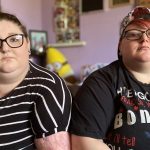Two former employees of the housing association that managed the flat in which mould killed Awaab Ishak have claimed more people could die as they accused it of having a “toxic and bullying culture”.
Rochdale Boroughwide Housing (RBH) controls more than 12,000 homes in the area.
Two years on from Awaab’s death, Sky News witnessed a number of properties on the Freehold Estate in Rochdale, where the boy and his family lived, with severe mould and damp.
Two ex-employees who resigned over the culture within RBH told Sky News that tenants are suffering because of the poor standard of accommodation.
Gareth Swarbrick, its chief executive, was sacked on Saturday, with the association’s board saying he had been removed with “immediate effect”.
An employee who worked at RBH for six years, Dave (not his real name), told Sky News: “The culture was horrible. It was bullying, toxic for the employees. It’s not fit for purpose at all. It’s meant to be run as a charity for the focus of the tenants [but] nothing could be further from the truth.”
When Awaab’s parents were complaining about the state of their mouldy and damp flat in 2017, Dave was working in the association’s call centre.
“All the staff were advised to tell anyone ringing up to just open up your trickle vents on your window – make sure you ventilate your property and put heating on and they would fob people off,” he said.
“The total disregard for the tenants and cost-cutting was so obvious and it’s really sad to be honest.”
Please use Chrome browser for a more accessible video player
‘Association is racist’
Awaab’s parents, who fled Sudan to seek asylum in the UK, claimed the housing association was racist.
Dave said he agrees with them. “In my view, yes [it is racist],” he said. “It’s sad to say but it is.”
RBH refuted his claim, telling Sky News: “We are not a racist organisation, but we accept that assumptions were wrongly made in Awaab’s case. We are taking swift action to review our current approach and changes we need to make.”
There is only one way to avoid another tragedy, Dave claimed. “I definitely think there’ll be more deaths due to the lack of repairs,” he said.
“I think the only way that tenants will be safe is if RBH is closed down and the council takes it back over.”
Another employee, who resigned this year, quit after she heard about how and why Awaab had died.
Julie (not her real name) claimed the management “covered it up” and did not tell staff what had happened.
She told Sky News: “I knew one day RBH would make headlines because of how bad it was getting. I just hoped it wasn’t through the death of someone, especially a tenant. Even worse, it was a little boy.”
Julie added: “It just wasn’t right what they were doing. They were saying one thing and doing another – and that wasn’t right for me morally.”
On the culture of RBH, Julie commented: “It was toxic and people were getting away with treating employees how they wanted to, especially ones that challenged decisions. They’d be disciplined. In the end it just put a fear factor through the organisation.”
Awaab died in December 2020. A coroner’s inquest concluded this month that he lost his life because of prolonged exposure to mould and damp in the inadequate accommodation provided by Rochdale Boroughwide Housing.
This should be a defining moment for the social housing sector, the coroner said.
RBH told Sky News it was “disappointed that two former employees claimed there is a culture of bullying”, adding: “We are an employee and tenant-owned mutual organisation with a strong set of values at our core. Our culture is one of collaboration and mutuality.”






















